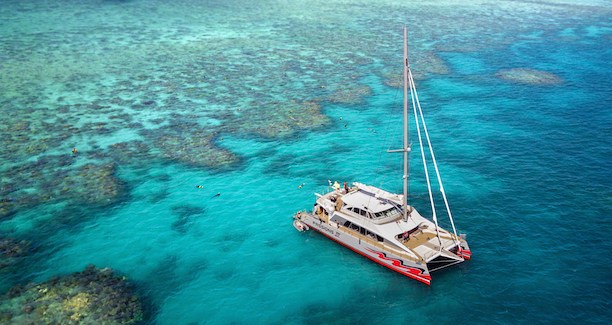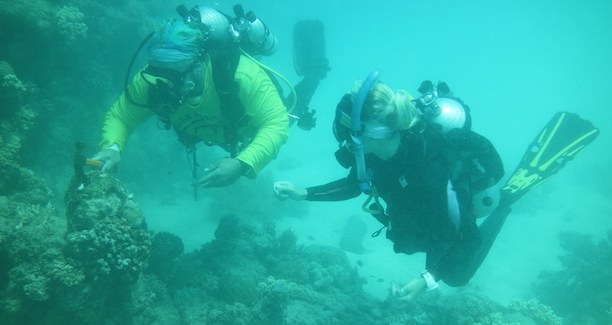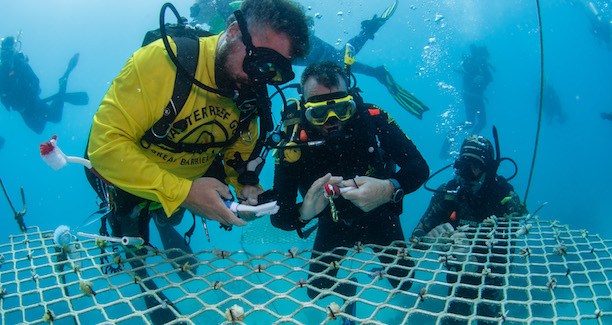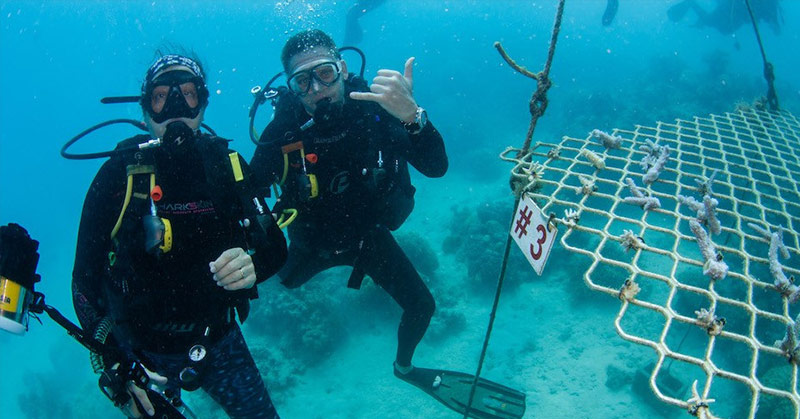The COVID-19 pandemic has brought many industries to a grinding halt. With travel restrictions, grounded airplanes, and closed borders, the tourism sector has been one of the hardest-hit industries across the globe.
In Australia, this has meant that snorkeling and scuba diving tours of the Great Barrier Reef have been suspended until further notice. While many touring companies have simply closed their doors and sent everyone home, there are a few that are using its resources and man-power to help repair the reefs in their area.

The Coral Nurture Program
The family-owned tour company, Passions of Paradise, has volunteered to assist scientists by planting coral on the Great Barrier Reef. They have donated their state-of-the-art catamaran, Passions III, to take four crew members and one scientist to Hastings Reef for the Coral Nurture Program.
The company has been working with Dr. David Sugget’s team from the University of Technology Sydney, who is conducting research on reef resilience at the site.
“I have been working with Passions of Paradise Environmental Sustainability Coordinator Russell Hosp at the site most weeks recording data for the project and establishing a coral nursery,” said Passions of Paradise CEO, Scott Garden [1].
Passionate About Eco Tourism
Passions of Paradise is the leading ecotourism company in Cairns, Australia. They work with the Australian Rainforest Foundation to offset their carbon emissions, support The Great Barrier Reef Marine Park Authority’s “Eye on the Reef” Program”, and they support scientific research on sharks and stingrays.
Last year, the company helped plant 1200 trees in the Daintree Rainforest, they voluntarily completed over seventy surveys on the health of the coral reef, and have donated almost $30,000 to the Oceania Chondrichthyan Society since 2007.
Passions of Paradise is also partnered with Project AWARE, which is one of the largest marine conservation organizations in the world [2].

A Landmark Program
The Coral Nurture program is the first time on the Great Barrier Reef that tourism operators and researchers are working alongside each other. It is also the first time that a coral clip is being used to attach corals to the reef.

The process involves finding coral fragments that have broken off naturally and attaching them back to the reef with the clip.
“We can only use fragments of opportunity found at the site, so Passions of Paradise has installed six frames at the site which can be used as a nursery to grow more corals,” said project coordinator and PhD student Lorna Howlett [1].
The nurseries give coral fragments an opportunity to grow. As the coral gets bigger, scientists can take a fragment off of it and attach it to the reef. In this way, the nurseries will act as a continual source of new corals.
The project is set to finish next month, and once it is completed it will have been in operation for one year. Upon completion, however, the operators can continue to take care of the nurseries and outplant the corals.
Approximately one thousand pieces of coral have already been planted on the Hastings Reef.
“When tours resume passengers will be able to snorkel over the site which boasts healthy marine life and corals near the nursery,” says Garden [1].
Four other reef companies are participating, including Wavelength, Ocean Freedom, Sailaway, and Quicksilver Cruises [1].
Nature Benefitting from a Pandemic
This project is yet another example of how the environment has been a very clear beneficiary of the COVID-19 pandemic. With a slower pace of life and significantly reduced traffic in the oceans, particularly on the shorelines, conservationists are being given some time to get a significant amount of work done.
The natural world has been veritably turned upside down by this pandemic. With the sudden and drastic reduction of human activity, smog is lifting and skies are clearer, mountains are visible for the first time in decades, and animals are reclaiming spaces normally overtaken by people.
This pandemic has devastated families and hurt economies, but it has also given us a never-before-seen look at what the world would look like if humans ceased to exist, and how quickly our environment can recover when given the chance.
There is no doubt that we will continue to feel the effects of this pandemic long after the worst of it is over, but one can only hope that at least one of these effects will be a renewed dedication around the world to healing, preserving, and protecting our environment.

